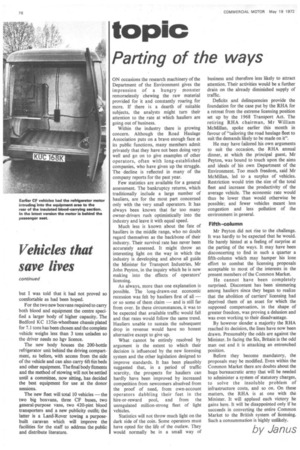topic
Page 80

If you've noticed an error in this article please click here to report it so we can fix it.
Parting of the ways
ON occasions the research machinery of the Department of the Environment gives the impression of a hungry monster remorselessly chewing the raw material provided for it and constantly roaring for more. If there is a dearth of suitable subjects, the analysts might turn their attention to the rate at which hauliers are going out of business.
Within the industry there is growing concern. Although the Road Haulage Association puts on a brave enough face at its public functions, many members admit privately that they have not been doing very well and go on to give examples of other operators, often with long-established companies, who have given up the struggle. The decline is reflected in many of the company reports for the past year.
Few statistics are available for a general assessment. The bankruptcy returns, which traditionally include a large number of hauliers, are for the most part concerned only with the very small operators. It has always been known that far too many owner-drivers rush optimistically into the industry and leave it with equal speed.
Much less is known about the fate of hauliers in the middle range, who no doubt regard themselves as the backbone of their industry. Their survival rate has never been accurately assessed. It might throw an interesting light on the way in which the industry is developing and above all guide the Minister for Transport Industries, Mr John Peyton, in the inquiry which he is now making into the effects of operators' licensing.
As always, more than one explanation is possible. The long-drawn-out economic recession was felt by hauliers first of all — or so some of them claim — and is still far from over. In these circumstances, it was to be expected that available traffic would fall and that rates would follow the same trend. Hauliers unable to sustain the subsequent drop in revenue would have no honest alternative except to give up.
What cannot be entirely resolved by argument is the extent to which their decision is influenced by the new licensing system and the other legislation designed to improve standards. It has been plausibly suggested that, in a period of traffic scarcity, the prospects for hauliers can hardly have been improved by increased competition from newcomers absolved from the proof of need, from own-account operators dabbling their feet in the hire-or-reward pool, and from the unregulated million-strong fleet of light vehicles.
Statistics will not throw much light on the dark side of the coin. Some operators must have opted for the life of the outlaw. They would normally be in a small way of business and therefore less likely to attract attention. Their activities would be a further drain on the already diminished supply of traffic.
Deficits and delinquencies provide the foundation for the case put by the RHA for a retreat from the extreme licensing position set up by the 1968 Transport Act. The retiring RHA chairman, Mr William McMillan, spoke earlier this month in favour of "tailoring the road haulage fleet to suit the demands likely to be made on it".
He may have iailored his own arguments to suit the occasion, the RHA annual dinner, at which the principal guest, Mr Peyton, was bound to touch upon the aims and ideals of his own Department of the Environment. Too much freedom, said Mr McMillan, led to a surplus of vehicles. Restriction would trim the size of the total fleet and increase the productivity of the average vehicle. The economic rate would thus be lower than would otherwise be possible; and fewer vehicles meant less congestion and less pollution of the environment in general.
Fifth-column Mr Peyton did not rise to the challenge. It was hardly to be expected that he would. He barely hinted at a feeling of surprise at the parting of the ways. It may have been disconcerting to find in such a quarter a fifth-column which may hamper his lone effort to combat the licensing proposals acceptable to most of the interests in the present members of the Common Market.
He cannot have been completely surprised. Discontent has been simmering among hauliers since they began to realize that the abolition of carriers' licensing had deprived them of an asset for which the supposed compensation, in the shape of greater freedom, was proving a delusion and was even working to their disadvantage.
By however slender a majority the RHA reached its decision, the lines have now been drawn. Presumably the odds are against the Minister. In facing the Six, Britain is the odd man out and it is attacking an entrenched position.
Before they become mandatory, the proposals may be modified. Even within the Common Market there are doubts about the huge bureaucratic army that will be needed to administer a system of statutory charges, to solve the insoluble problem of infrastructure costs, and so on. On these matters, the RHA is at one with the Minister. It will applaud each victory he gains here. It will be disappointed only if he succeeds in converting the entire Common Market to the British system of licensing. Such a consummation is highly unlikely.
by Janus




























































































































